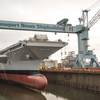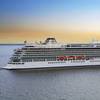With Indonesian President Joko Widodo declaring his intention to develop the long-neglected maritime sector, the shipping industry expect greater opportunities.
Indonesia’s shipyards may see a silver lining to what has been a cloudy past as the government’s focus on the maritime sector is reinforced by steps to improve the national logistics system, states a report in Jakarta Globe.
President Joko Widodo has declared his intention to develop the long-neglected maritime sector. Many parties in the shipping industry and related businesses are confident that the time has finally come for Indonesia to redefine its logistics systems to provide greater opportunities for shipping companies while at the same time lowering the cost of shipping goods.
According to industry players, the first key step is for the government to free the shipyard business from the tariffs that add 25% to production costs.
Indonesia long ago realized the importance of the shipping business in the country’s logistics systems, but it has been painfully slow in acting to create efficiencies. Shipyards sit idle, without work to keep them busy, since shipping companies prefer to import ships rather than buy from local manufacturers.
Lack of incentives and no specific shipping policies in the past have caused inefficiencies in the industry, insdustry observers said. While the introduction of the cabotage principle has seen the number of ships — operated by 1,200 shipping companies — increase to 13,244 in 2014, compared with only 5,000 ships seven years ago and total capacity increase to 19m gt from 5.6m gt scale is not everything, said INSA head Carmelita Hartoto.
Indonesia needs more than just the cabotage principle. Issues related to port development and shipbuilding management as well as infrastructure need attention too, she said. Despite growing demand, national shipyards are not able to meet the market demand because of a range of problems.
As the situation currently stands, high costs at Indonesian yards mean their ships are 30% more expensive than Chinese products.Taxes discriminate against local shipyards by charging about 30% on imported components and value-added tax, while ship imports are tax-free.











